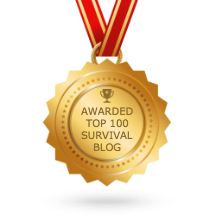 The most
important thing about a bug out bag is the QUALITY of the bag itself.
You will be entrusting this bag with your life, so try to get a good
quality. The best ones have a place for a water bladder, straps and good
amount of outside pockets.
The most
important thing about a bug out bag is the QUALITY of the bag itself.
You will be entrusting this bag with your life, so try to get a good
quality. The best ones have a place for a water bladder, straps and good
amount of outside pockets.Remember the four 3's:
3 minutes without Oxygen, 3 hours in harsh weather, 3 days without water, 3 weeks without food.
Shelter- Shelter is the most important (3 hours in bad weather). If you know how to pitch a tent correctly then all this may mean to you is packing a tarp and equipment to set it up. If you don't then remember to pack something you know how to setup. Also remember to pack a sleeping bag and anything else you might need to keep you dry and warm.
Water- Water is behind shelter (3 days without water). Pack a few water bladders and remember to keep your water bladder filled with clean water (this may mean dumping the water in it and refilling it every now and again to make sure the water is nice and clean if the situation arises where you need to use it). Also, a water filter can save your life if you run out of water. Never drink water in the wild without boiling/treating it. Recommended amount of water intake is different for everyone but a good way to think about is half your weight in fluid ounces. So if your weight 150 pounds, 75oz a day is your recommended amount. 128 fluid ounces is a gallon so that would mean you need to drink a little more than half a gallon a day.
Food-Food is in last at 3 weeks (that's assuming you have water). Freeze dried food and MRE's are recommended for survival because they are high calorie food rations that will provide your body with the energy it needs. Trail mix also has a lot of calories so you may want to consider packing some to eat while you're traveling. Like water, the recommended amount of calories differs from person to person depending on height, weight, gender and more but try to eat 3,000 calories a day. Never eat below 1,200 calories a day.
Checklist:
Here is a simple checklist for your bag (This is not set in stone, everyone has difference skills and this is just to give you an idea):
Flashlight
A good survival knife
Tape (Duct Tape/Gorilla Tape)
MRE's or freeze dried food
Sewing kit
Some form of getting your hands clean if needed (dish soap, bar soap, etc.....)
Bottles of Water (Water Bladder that's filled would be good too. Water purification tablets and a water filter would be good as well)
Multi-tools are very good to have because they take up less room
Radio (Hand Crank/Solar would be best but battery operated is fine)
Rechargeable batteries for your equipment that needs them.
Camp stove (try to find one that uses multiple fuels)
A copy of emergency and important contacts (include addresses and phone numbers)
First Aid Kit
Money (If you have to leave your city for a few days
Maybe an extra copy of your I.D.
Para cord (preferred) or very strong rope
Map of the area
Hygiene necessities (comb, toothbrush, small can of shaving cream, razor, toothpaste)
A waterproof way of starting fire (flint/waterproof matches/etc...)
Extra change of clothes (include socks and underwear)
Can opener (small one)
A list for defensive purposes:
100+ extra rounds for each of your firearms
a form of night vision sight (Sighting scope, a rifle scope that functions in daylight and night, etc...)
Remember to camouflage all of your equipment (including your bug out bag itself)
This is Jeff from Survival
Hour we are dedicated to informing the public how to survive almost any
situation and providing the best gear to help. Be sure to check out our
Survival Hour blog as well for even more in-depth information.
Check here for some good stock bags to start with(you should add a lot more stuff to them though): Bug Out Bags
Check here for some good stock bags to start with(you should add a lot more stuff to them though): Bug Out Bags




0 comments:
Post a Comment